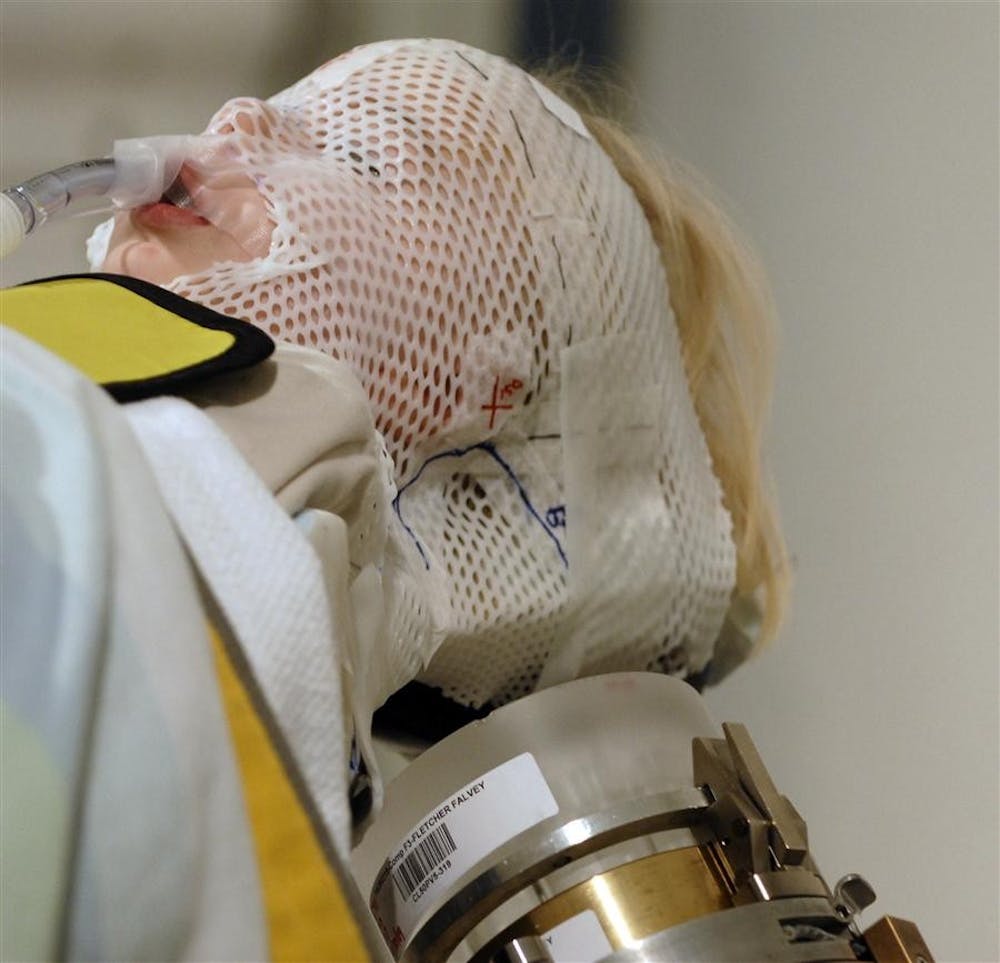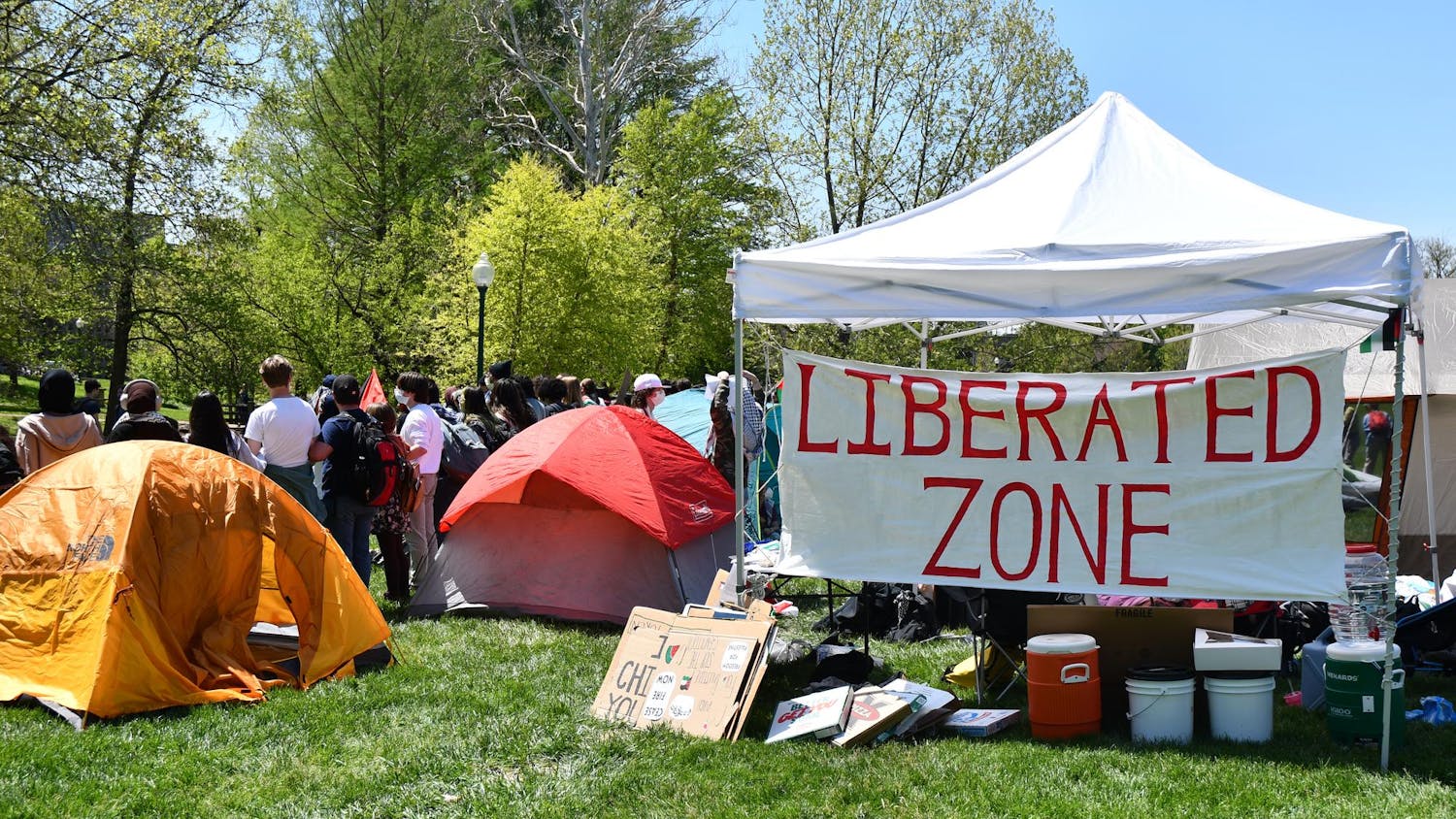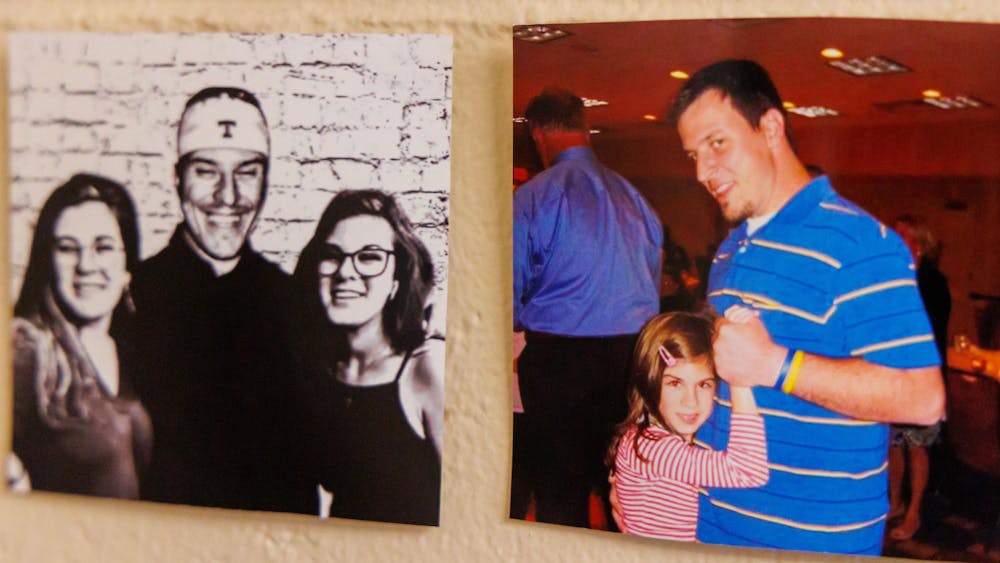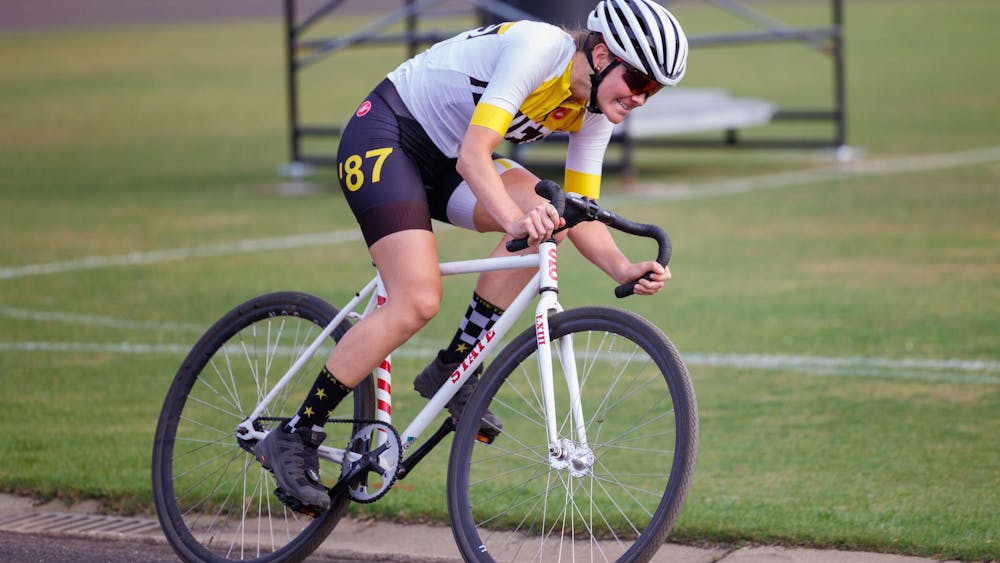At 8:10 a.m. on a Tuesday, the Falveys are running 10 minutes late for 3-year-old son Fletcher’s treatment at the Midwest Proton Therapy Institute in Bloomington.
With open smiles, father Noel chases Fletcher into the treatment room. Following close behind is Andrea, Fletcher’s mother. The mood changes as Noel scoops Fletcher up and onto his lap while doctors waste no time gassing the toddler.
Noel presses his face against Fletcher’s head, and Andrea rubs his cheek as the boy slowly loses consciousness. His high-pitched moan fills the room, leading into the sticker-filled corridor and echoing through the main hallway.
But Noel and Andrea are just happy to see their “little mate” running before another round of radiation therapy.
The need of about $215,000 for treatment at MPRI is in the back of their minds. MPRI is one of the six facilities in the United States that treats cancer through radiotherapy. Patients typically come from all over the world.
***
Three months ago in Velez-Malaga, Spain, Noel wrote in his online diary:
“What’s the worst thing you could hear? ‘I’ve some bad news, your son has a tumor in his brain. Hello, I’m your brain surgeon.’”
Aug. 14, two days after this post, a team of doctors cut into Fletcher’s head to remove an anaplastic ependymoma brain tumor.
“Dread,” Noel writes, wondering if this could be the last time he, Andrea, and their 8-year-old daughter Shannon will see Fletcher alive.
The surgery took seven hours, but doctors could only remove 80 to 90 percent of the tumor because of its location around the brain stem, where breathing and heart rate are controlled.
The family’s three-week stint at the hospital left Fletcher with a fear of doctors and generally anything he is unfamiliar with. Because of this fear, Noel has to be around to help Fletcher cooperate with the new doctors at MPRI.
“I had to physically hold him down while they removed the stitches from his head,” Noel said. “I had to do that.”
The rest of the tumor still needs to be removed, or Fletcher will die in a matter of years.
For a developing mind like Fletcher’s, conventional radiotherapy would cause intense brain damage, rendering the 3-year-old deaf, possibly blind and with severe learning difficulties.
Option two: tomotherapy radiation, which was the best Spain had to offer and was free of charge. Still, too dangerous for Fletcher.
The Falveys got Andrea’s brother to look into proton beam therapy after Noel heard a story on an English radio station about another child who had the same diagnosis as Fletcher who received the treatment and is now doing fine.
Two weeks later Fletcher was accepted to receive proton treatment at MPRI. Originally from Bexley, England, the family lived a year and a half in Torrox, Spain. Now, they’re in Bloomington.
“I can’t help but thinking how lucky we are,” Noel said, “God only knows how many people did not have this chance.”
***
The gas kicks in, and Fletcher goes limp in Noel’s arms. He is placed on a mold that keeps him in place during the treatment while doctors access a vein through a port in his chest and hook up monitors to check his vitals. The Falveys have left the room well before this happens.
They have never seen the actual treatment done on Fletcher.
“I wouldn’t want to,” Andrea says.
Doctors tape his eyelids shut and put a white, meshed mask that covers his entire head with a slit in the mouth area for the incubator. A large monitor outside the treatment room states “DO NOT ENTER, BEAM ON”.
Noel temporarily leaves MPRI to drop Shannon off at school, and Andrea sits on the computer and makes small talk with patients in the waiting room, trying to keep her mind off things.
On his way back to MPRI, Noel blasts rock band Kasabian from the stereo in his rental car – perhaps to drown out his thoughts.
The previous day Fletcher woke up in a fit from the anesthesia. It took him 50 minutes to stop screaming.
Because of his age, he has to be put under so he will not move during the treatment.
Andrea’s diary entry from the previous day: “He was shouting at us: “I dont like you,” and “I dont want you.” This upset me a lot. He has never said anything like that before; it’s just not in his nature.”
Both parents worry what today’s treatment will bring.
***
The Falveys need to raise $215,000 to cover Fletcher’s treatment.
Family friends and those influenced by Fletcher’s story are avidly raising money for and donating to the Falveys.
The Falvey’s financial situation is not that uncommon from other patients at MPRI, as a lot of their expenses go uncovered by health insurance. The Falvey’s have a bank account people can donate to through the Web site friendsoffletcher.com
“All I’m worrying about is that the treatment will work...” Andrea said.
“Because you don’t get much of a second chance,” Noel said.
They are right to worry.
“There’s not much else that can be done,” said Dr. Andrew Chang, director of pediatric radiation oncology at MPRI. “If the tumor comes back at a quick pace, it will take his life. If the tumor comes back at a slower pace, further radiation treatment can be considered, but it is not looked highly upon.”
Chang specializes in pediatrics and also does work at the IU School of Medicine and Riley’s Children’s Hospital in Indianapolis. He had to inform Noel and Andrea that Fletcher has a 50 to 60 percent chance of surviving.
Noel writes: “Afterwards Dr. Chang offers to say a prayer for us. Why not? He prays while I cry”.
Hope they have, but faith – not so much.
Religion has never been a part of the family. That is not to say they are not appreciative of all the support they have been given from Sherwood Hills Church. They stay nearby in Sherwood Oaks, Ind., paying a reduced rent thanks to Hoosiers Care, a non-profit organization helping hospital patients from out-of-town find homes during treatment.
They will be there until Fletcher’s seven weeks of treatment is over, around Nov. 20.
“Here, it’s not just something they pay lip service to and go to church on Sunday to be seen to be doing it and because their parents expect it – they want to,” Noel said. “More, here is what I feel the essence of it would be if it were really good.”
***
Fletcher wakes up alone.
His scream builds up and breaks into a cry, and then back into a scream: Doctors and hospital staff at MPRI realize Fletcher just woke up from the anesthesia.
He curls up on a wheeled hospital bed being pushed into a room across the hall.
Andrea follows him into the room. Bending over, she coils her arms around him while Fletcher’s screaming muffles whatever she might be saying.
This scene plays out for a while until Noel comes through the main the hallway doors and, hearing Fletcher’s cries, he quickens his pace down the hallway.
27 more treatments to go, but they have gotten easier on Fletcher since the anesthesiologist increased his dosage, allowing for more sleep.
After 40 minutes of Fletcher being upset, his mood is temporarily swayed by a big orange freeze pop provided by MPRI manager, marketing and development Amanda Burnham.
While Andrea and Noel speak with Dr. Chang, Burnham gets Fletcher to go to the playroom with her. He does a wobbly run down the hallway, falls over, and pushes the handicap button to open the doors.
***
A tense silence, an overdue sigh from Noel.
“I would like to look back on this time of my life and think ‘that was when we saved Fletch’s life,’” he said.
Shannon and Fletcher come bounding into the room.
“He’s an elephant, I’m a bunny,” Shannon announces.
Andrea tells her to go back into the other room.
“Come, Fletch,” Shannon says.
Shannon, with bunny ears on her head, hops away into the next room. Fletcher follows her, giving his best series of hops and nearly falling over.
The operation has swelled Fletcher’s brain, putting pressure on his optic nerve and making him “boss-eyed.” On top of things, he has not been physically active in the last months, all of which cause him to frequently fall.
The time surrounding the brain operation took the heaviest toll on the family. A fresh scar still shoots up the back of Fletcher’s head, where his thin, shaggy, blonde hair is permanently singed.
“It was loads of things, like when we could hear him crying as we walked away and left him to get anesthetized,” Noel said.
Andrea can barely talk about her experiences without crying.
“When we were in the hospital he said to me, ‘I’m not broken, doctors fixed me,’” she said. “That’s what he decided.”
The three-year-old has not the faintest idea of the cancer in his brain or the fact that he could die; because Andrea and Noel do not tell him, hoping at least the trauma will not leave a scar.
They do however disclose things to Shannon, who happens to be in the process of writing a book for school about her brother.
But talking has not been one of the Falvey’s strong points lately, though they are trying to improve.
“It got to a point for me where I just wanted to stop finding out about stuff, and I just wanted to shut it all out,” Noel said. “We weren’t talking to each other. ... I need Andrea, I couldn’t do it without her.”
It is this kind of stress and pressure that can tear a family apart.
“It’s been tough. I can see how some couples wouldn’t make it, and I worry about it because I also think that we’re just starting,” Noel said.
Andrea has had many sleepless weeks. When she tries to sleep, the silence and solitude creeps up, allowing her mind to go. Only now with a herbal sleeping aid has she been able to sleep a little better, she said.
Fletcher is a very happy, playful three-year-old. At moments though, the simple joy a parent gets from watching their child at play has been robbed.
“Sometimes it just gets too much,” Noel said. “The pressure just feels physical, like I’m being suffocated or a weight pushed down on me. I feel at times I can actually feel it, even if I’m not thinking it.”
MPRI patient’s family faces uncertainty, fear

Get stories like this in your inbox
Subscribe





